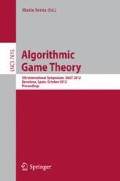Abstract
We study mechanisms for combinatorial auctions that are simultaneously incentive compatible (IC), envy free (EF) and efficient in settings with capacitated valuations — a subclass of subadditive valuations introduced by Cohen et al. [4]. Capacitated agents have valuations which are additive up to a publicly known capacity. The main result of Cohen et al. [4] is the assertion that the Vickrey-Clarke-Groves mechanism with Clarke pivot payments is EF (and clearly IC and efficient) in the case of homogeneous capacities. The main open problem raised by Cohen et al. [4] is whether the existence result extends beyond homogeneous capacities. We resolve the open problem, establishing that no mechanism exists that is simultaneously IC, EF and efficient for capacitated agents with heterogeneous capacities. In addition, we establish the existence of IC, EF, and efficient mechanisms in the special cases of capacitated agents with heterogeneous capacities, where (i) there are only two items; or (ii) the individual item values are binary. Finally, we show that the last existence result does not extend to the stronger notion of Walrasian mechanisms, i.e. mechanisms whose allocation and payments correspond to a Walrasian equilibrium.
A full version of this paper including all proofs is available on the authors’ websites.
Access this chapter
Tax calculation will be finalised at checkout
Purchases are for personal use only
Preview
Unable to display preview. Download preview PDF.
References
Ausubel, L.M., Milgrom, P.: The lovely but lonely vickrey auction. In: Combinatorial Auctions, ch. 1. MIT Press (2006)
Bikhchandani, S., Ostroy, J.: The package assignment model. Journal of Economic Theory 107(2), 377–406 (2002)
Clarke, E.H.: Multipart pricing of public goods. Public Choice, 17–33 (1971)
Cohen, E., Feldman, M., Fiat, A., Kaplan, H., Olonetsky, S.: Truth, Envy, and Truthful Market Clearing Bundle Pricing. In: Chen, N., Elkind, E., Koutsoupias, E. (eds.) WINE 2011. LNCS, vol. 7090, pp. 97–108. Springer, Heidelberg (2011)
Dubins, L.E., Spanier, E.H.: How to cut a cake fairly. The American Mathetmatical Monthly 68(1), 1–17 (1961)
Foley, D.K.: Resource allocation and the public sector. Yale Economic Studies (1967)
Green, J., Laffont, J.: Characterization of satisfactory mechanisms for the revelation of preferences for public goods. Econometrica 45(2), 427–438 (1973)
Groves, T.: Incentives in teams. Econometrica 41(4), 617–631 (1973)
Gul, F., Stacchetti, E.: Walrasian equilibrium with gross substitutes. Journal of Economic Theory 87, 95–124 (1999)
Holmstrom, B.: Groves schemes on restricted domains. Econometrica 47(5), 1137–1144 (1979)
Hurwicz, L.: Optimality and informational efficiency in resource allocation processes. In: Arrow, K.J., Karlin, S., Suppes, P. (eds.) Mathematical Methods in the Social Sciences. Stanford University Press (1960)
Leonard, H.B.: Elicitation of honest preferences for the assignment of individuals to positions. The Journal of Political Economy 91(3), 461–479 (1983)
Maskin, E.S.: On the fair allocation of indivisible goods (1987)
Moulin, H.: Fair Division and Collective Welfare. MIT Press (2004)
Mu’alem, A.: On Multi-dimensional Envy-Free Mechanisms. In: Rossi, F., Tsoukias, A. (eds.) ADT 2009. LNCS, vol. 5783, pp. 120–131. Springer, Heidelberg (2009)
Pápai, S.: Groves sealed bid auctions of heterogeneous objects with fair prices. Social Choice and Welfare 20(3), 371–385 (2003)
Rafaeli, A., Kedmi, E., Vashdi, D., Barron, G.: Queues and fairness: A multiple study experimental investigation. Technical report, Technion-Israel Institute of Technology (2003)
Svensson, L.: On the existence of fair allocations. Journal of Economics 43(3), 301–308 (1983)
Author information
Authors and Affiliations
Editor information
Editors and Affiliations
Rights and permissions
Copyright information
© 2012 Springer-Verlag Berlin Heidelberg
About this paper
Cite this paper
Feldman, M., Lai, J. (2012). Mechanisms and Impossibilities for Truthful, Envy-Free Allocations. In: Serna, M. (eds) Algorithmic Game Theory. SAGT 2012. Lecture Notes in Computer Science, vol 7615. Springer, Berlin, Heidelberg. https://doi.org/10.1007/978-3-642-33996-7_11
Download citation
DOI: https://doi.org/10.1007/978-3-642-33996-7_11
Publisher Name: Springer, Berlin, Heidelberg
Print ISBN: 978-3-642-33995-0
Online ISBN: 978-3-642-33996-7
eBook Packages: Computer ScienceComputer Science (R0)

